How to Talk About Family in Japanese (+BONUS Quiz)
Level Up Your Japanese with Key Family Member Vocabulary || PLUS Test Your Knowledge
Talking about family is often one of the first, most important things you study when learning a new language- and with good reason!
Family is a fantastic topic to immediately form connections with people and it’s certainly a topic you’re going to be asked about.
However, this is not to say that there aren’t any rules or customs you need to be aware of.
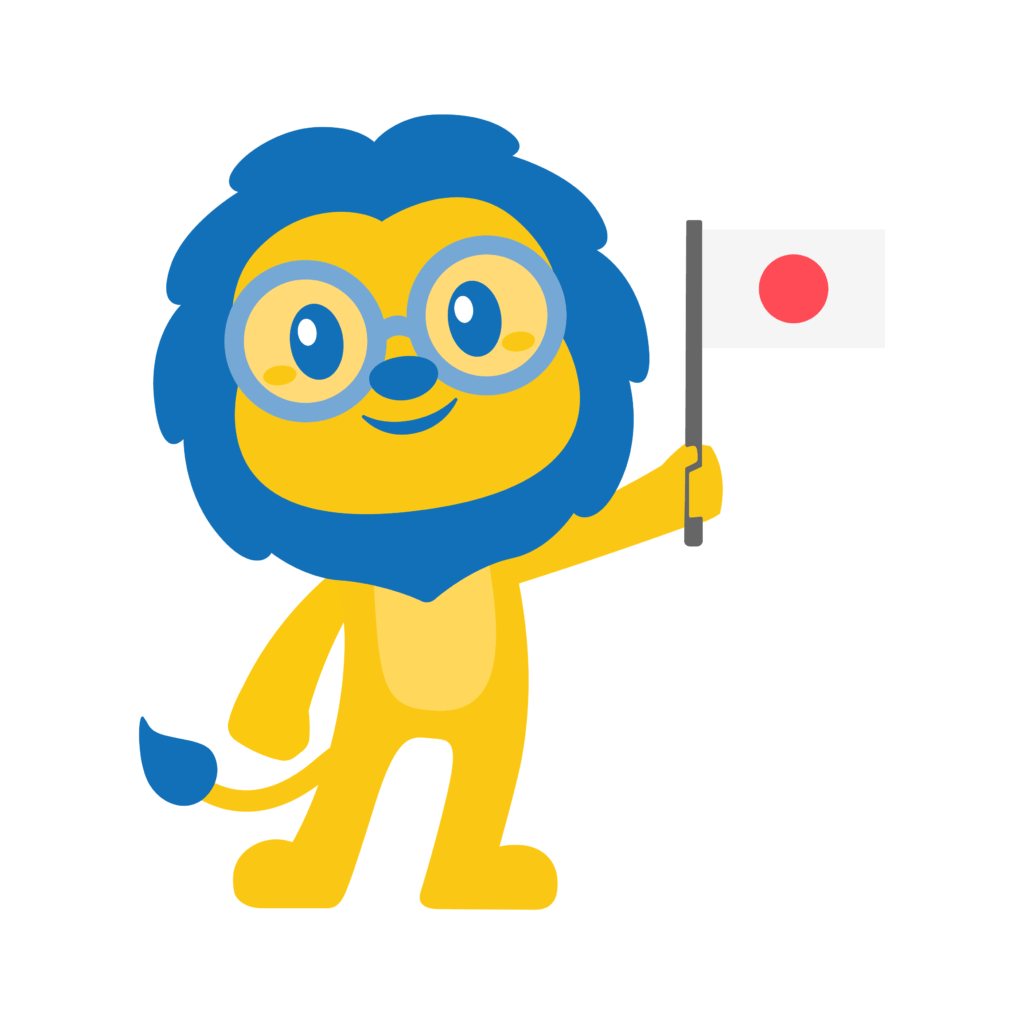
As we mentioned in a previous article about pronouns in Japanese, the way you address someone, especially someone older than you, is very important in Japan, even if its just family!
TOP TIP || The main thing to be aware of is that, in Japanese, when you are talking about your own family you would use different words than you would talking about someone else’s family.
Also, when you’re talking directly to members of your family, you might use something different too!
Not sure how this works? Not to worry – we’ll include explanations and examples throughout!
Let’s dive right in!
Here is our complete guide to talking about family in Japanese and keep reading for a bonus quiz at the very end!
Japanese Family Tree || Immediate Family
Japanese Family Tree || Grandma and Grandpa
Japanese Family Tree || Aunt and Uncle
Japanese Family Tree || Cousins
Japanese Family Tree || Nieces and Nephews
Japanese Family Tree || Quiz
Japanese Family Tree || FAQs
Family in Japanese || Immediate Family Members
Let’s start by looking at the different ways of saying the different family members, and then we’ll go into how to know which term of address to use in different situations.
Important: The first word for each relative is how you would refer to your own family members, the second is how you would refer to someone else’s family members.
| English | Kanji | Furigana | Romaji |
| Mum | 母 | はは | haha |
| お母さん | おかあさん | okaasan | |
| Dad | 父 | ちち | chichi |
| お父さん | おとうさん | otousan | |
| Daughter | 娘 | むすめ | musume |
| お嬢さん | おじょうさん | ojousan | |
| Son | 息子 | むすこ | musuko |
| 息子さん | むすこさん | musukosan | |
| Older Sister | 姉 | あね | ane |
| お姉さん | おねえさん | oneesan | |
| Younger Sister | 妹 | いもうと | imouto |
| 妹さん | いもうとさん | imoutosan | |
| Older Brother | 兄 | あに | ani |
| お兄さん | おにいさん | oniisan | |
| Younger Brother | 弟 | おとうと | otouto |
| 弟さん | おとうとさん | otoutosan | |
| Wife | 妻 | つま | tsuma |
| 奥さん | おくさん | okusan | |
| Husband* | 夫 | おっと | otto |
| 旦那さん | だんなさん | dannasan | |
| ご主人 | ごしゅじん | goshujin |
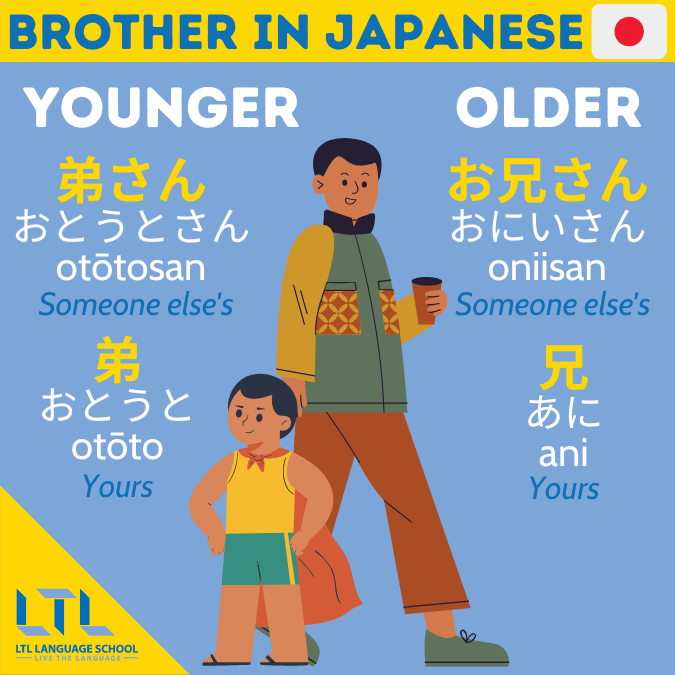
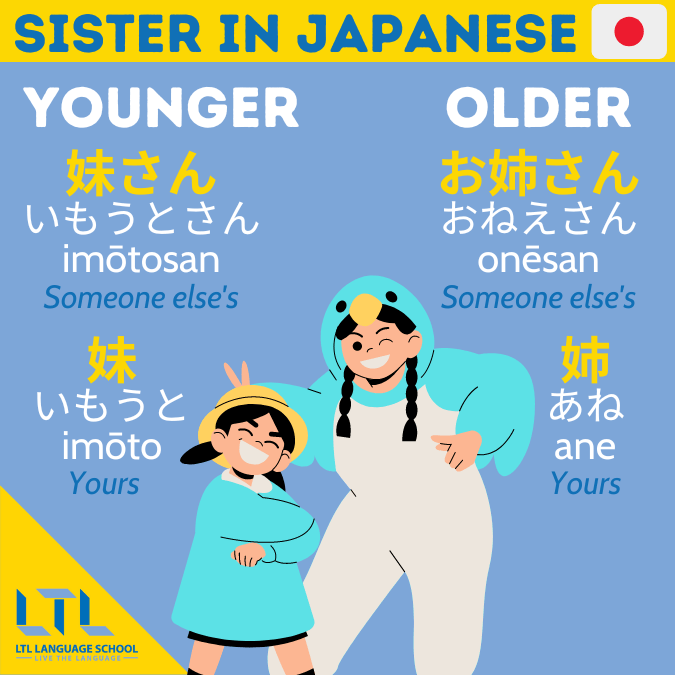
When you are talking about someone else’s family member (let’s say, their mum) or talking to your own family member (your mum), you should use the version with the honorific suffix, i.e., さん.
BE AWARE that although the same kanji may be used (e.g. 母), the pronunciation can be different based on the context (e.g. haha vs. kaa).
Let’s take a look at a couple of examples:
(あなたの)お母さんはどこに住んでますか。
(anata no) okaasan wa doko ni sunde imasu ka.Where does your mum live?
お母さん、私の鍵がどこにあるか知っていますか。
okaasan, watashi no kagi ga doko ni aru ka shitte imasu ka.Mum, do you know where my keys are?
However, let’s say you are talking about your mother to a friend…
(私の)母はロンドンで住んでいます。
(watashi no) haha wa rondon de sunde imasu.My mum lives in London.
*You’ll notice that for husband we have included three different forms of address instead of two. This is because the way you would talk to your husband is not the same way you would talk about about someone elses.
When talking to your husband, you can use 旦那さん (or even 夫, or just their name followed by さん), but when talking about someone’s husband, you should use ご主人.
Here are a couple of extra words that might be useful when talking about your immediate family:
Husband and wife = 夫婦 (ふうふ)
Parents = 両親 (りょうしん)
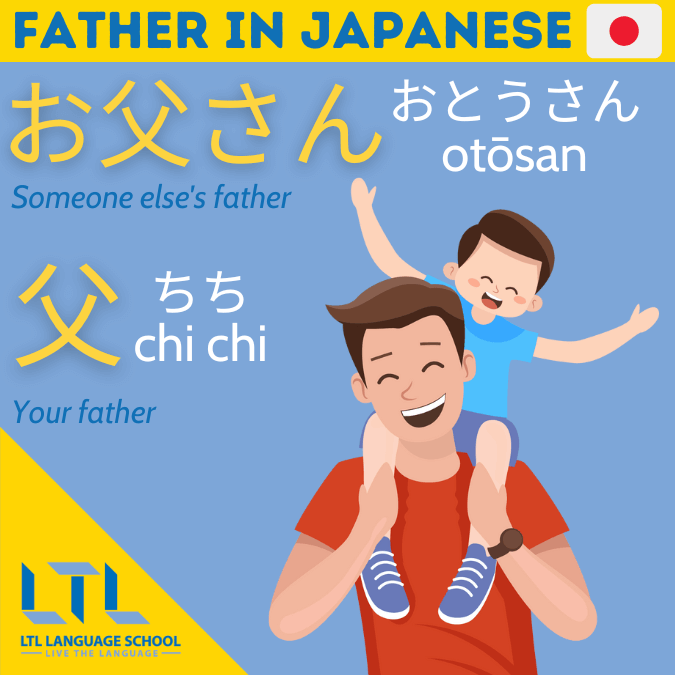
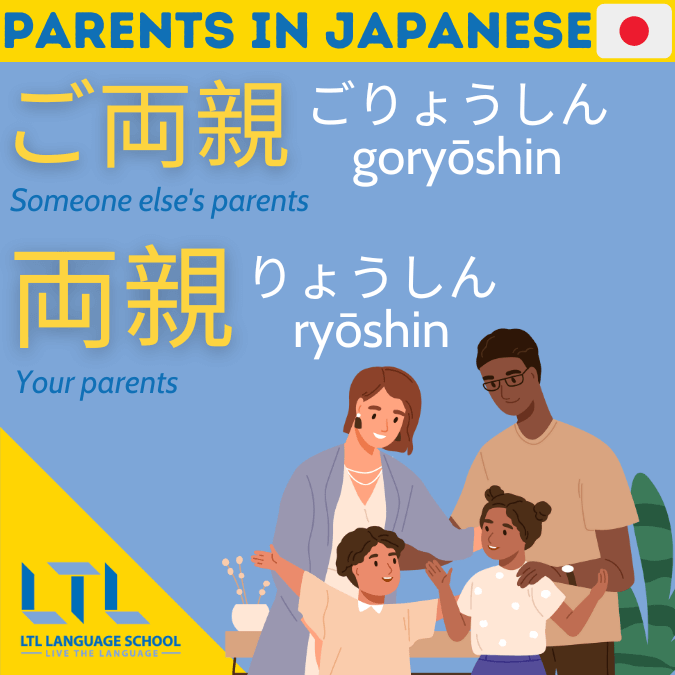
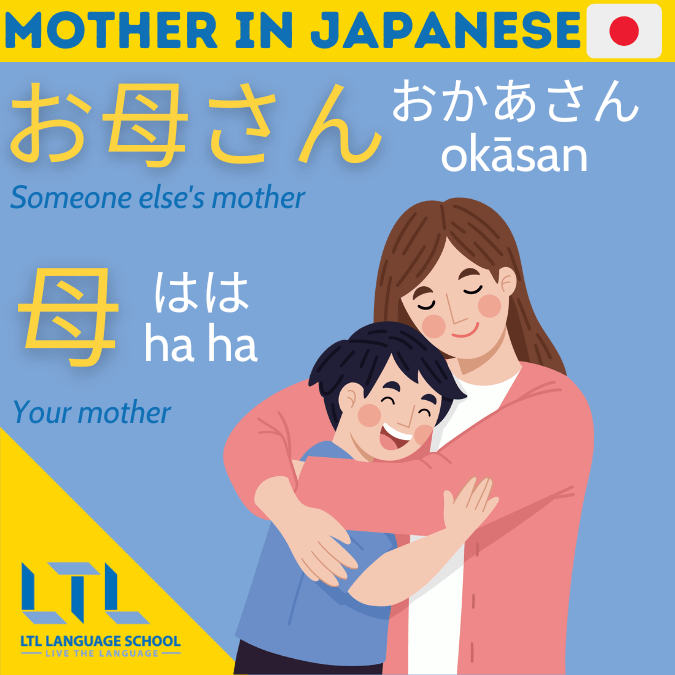
Family in Japanese || Grandma and Grandpa
As before, the first translation is used for your family members and the second translation is how you would refer to someone else’s family member.
| English | Kanji | Furigana/Hiragana | Romaji |
| Grandma | 祖母 | そぼ | sobo |
| おばあさん/ちゃん | obaasan/chan | ||
| Grandpa | 祖父 | そふ | sofu |
| おじいちゃん/ちゃん | ojiisan/chan |
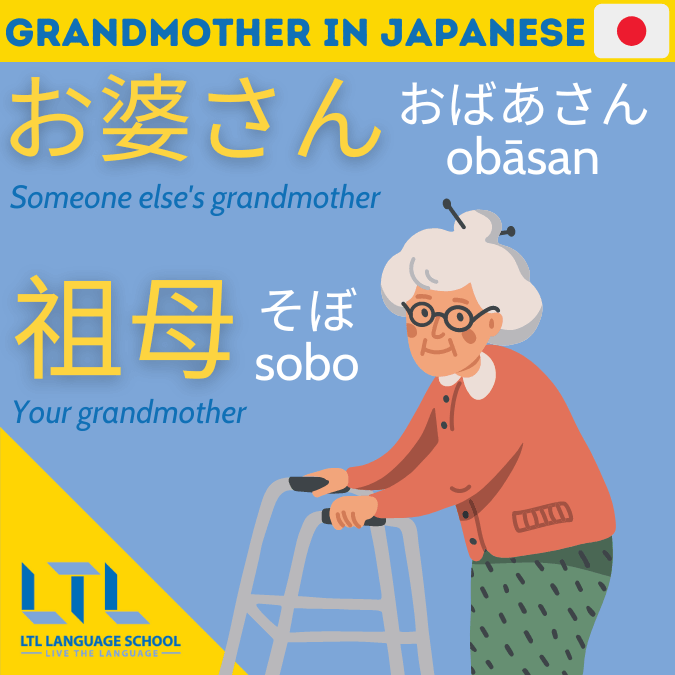
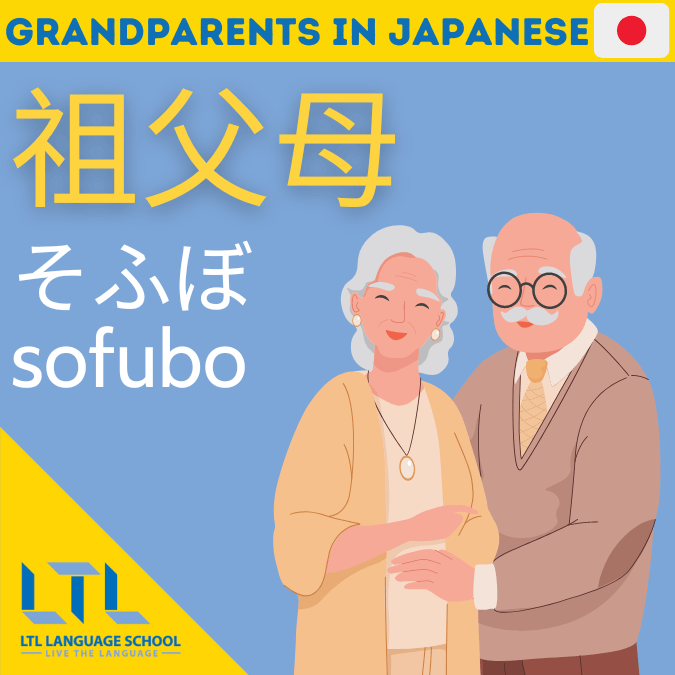
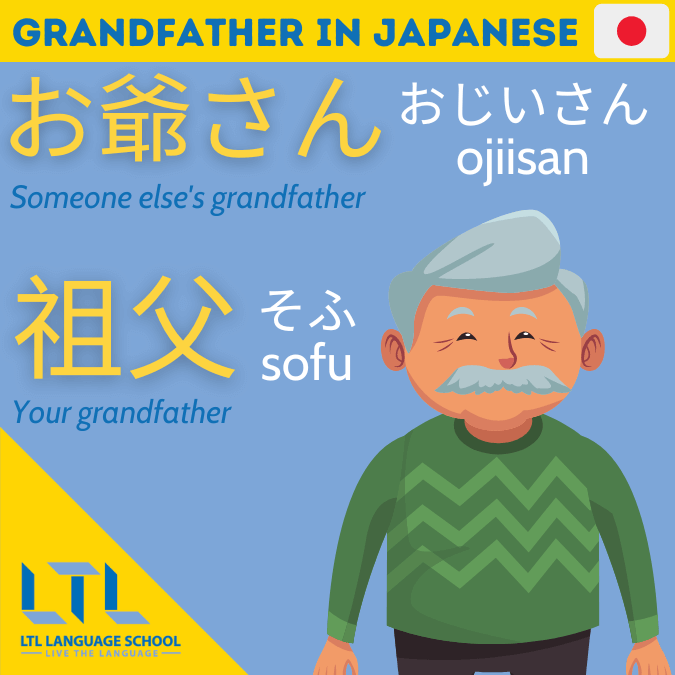
Unlike Chinese, Japanese language does not distinguish between maternal and paternal grandparents.
Just like when you’re talking about immediate family, use the honorific versions (i.e., おばあさん / おじいさん) when you are talking to your grandma/grandpa or about somebody else’s grandparent.
ちゃん is sometimes used instead of さん which shows a sense of familiarity.
DID YOU KNOW || おばあさん and おじいさん are both also used as respectful forms of address to someone your grandparents age.
How about if you want to talk about grandchildren?
孫 (まご)= grandchild
お孫さん (おまごさん)= (someone else’s) grandchild
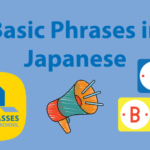
Basic Phrases in Japanese // Learn 32 Essential Phrases (With Flashcards & FREE Quiz)
Basic Phrases in Japanese // Learn these phrases to make your first steps when learning Japanese. We teach you how to get by when speaking basic Japanese.
Family in Japanese || Aunt and Uncle
As with “grandma” and “grandpa,” the Japanese language does not distinguish between maternal and paternal aunts/uncles.
It does, however, distinguish according to whether the relative is older or younger than your parent! But its easier than you think…
| English | Kanji | Furigana | Romaji |
| Uncle (older) | 伯父 | おじ | oji |
| 伯父さん | おじさん | ojisan | |
| Uncle (younger) | 叔父 | おじ | oji |
| 叔父さん | おじさん | ojisan | |
| Aunt (older) | 伯母 | おば | oba |
| 伯母さん | おばさん | obasan | |
| Aunt (younger) | 叔母 | おば | oba |
| 叔母さん | おばさん | obasan |
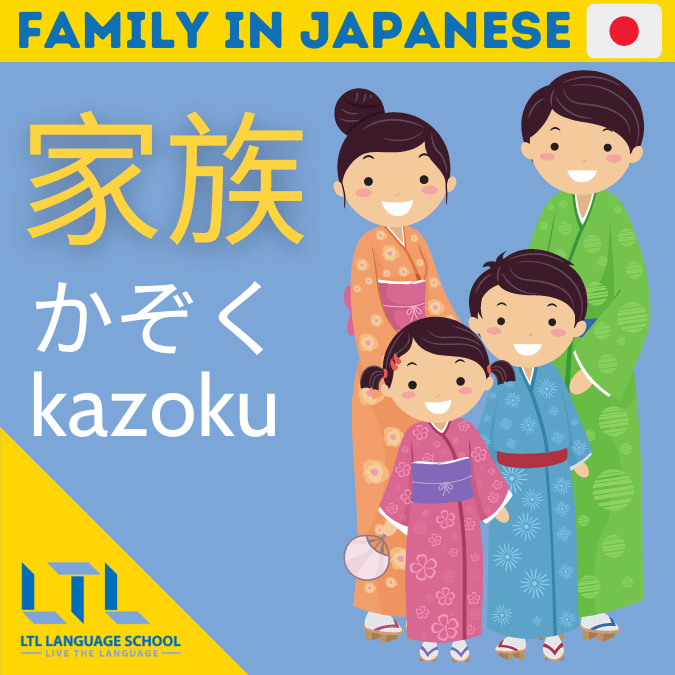
As you can see, although the kanji used for different aunts/uncles differs, the way you pronounce them is the same… which makes it harder to slip up, in our opinion!
One important thing to be aware of…
There is a strong similarity between the word for “grandma” おばあさん and “aunt” おばさん.
Take extra care when learning these!
How do you remember new vocabulary? Let us know in the comments below!
Family in Japanese || Cousins
In Japanese, people usually use いとこ to refer to their cousin. However, like with aunts and uncles, the specific kanji used can change on who you’re talking to.
従兄弟 = all male cousins
従姉妹 = all female cousins
従兄 = older male cousin
従姉 = older female cousin
従弟 = younger male cousin
従妹 = younger female cousin
REMEMBER, they are all pronounced いとこ (itoko).
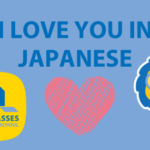
Express Your Love 💖 How to Say I Love You in Japanese
Today we open our hearts and teach you how to express you love in Japanese – welcome to our guide on how to say I love you in Japanese.
Family in Japanese || Nieces and Nephews
| English | Kanji | Furigana | Romaji |
| Niece | 姪 | めい | mei |
| Nephew | 甥 | おい | oi |
As you can see, talking about nieces and nephews is easy (especially compared with some of the other family members!)
Family in Japanese || Quiz
BONUS || Check out how to talk about Family in Chinese and Family in Spanish!
Family in Japanese || FAQs
How do you say family in Japanese?
In Japanese, family is 家族 (kazoku). To say my family, you simply need to add ‘my’ in Japanese, which is 私の (watashi no). Altogether this is 私の家 (watashi no kazoku).
What is mom in Japanese?
If you are talking about your own mom, you would use 母 (はは haha). If you are talking about someone else’s mother, you should instead use お母さん (おかあさん okaasan).
What does san mean in Japanese?
In Japanese, “san” (さん) is an honorific suffix commonly used as a respectful title to address someone. It is typically added to a person’s name or title to show politeness and respect. For example, “Tanaka-san” is a polite way to refer to someone named Tanaka. It can be used for both men and women.
How can I remember the different Japanese family words?
Practice, practice, practice! One of our favourite ways to learn new vocab is by using spaced repetition flashcard apps like Anki.
Psst… Did you know LTL has made lots of Japanese Anki decks so you don’t have to?
How can I practice speaking Japanese?
You can take classes at a time that suits you on our Flexi Classes platform, where you can choose between individual and small group classes and be taught by professional, native-speaker Japanese teachers.
Or why not come to Tokyo and take classes with us in person! You can even stay in an immersive homestay program.
Want More From LTL?
WANT TO LEARN JAPANESE? Check out our online Japanese courses here.
We offer a 7-day free trial to all new students where you can study 24/7.
What about studying Japanese in Japan instead? We’ve got your back. Our Japanese courses in Tokyo can either be taken in small groups of no more than 5 students or individually for a more tailored experience.
We even offer incredible homestay experiences in Tokyo as well.
Come and be a part of this amazing community.










